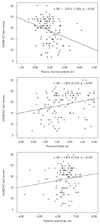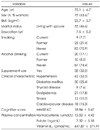Abstract
This study examined the relationship among plasma homocysteine, folate, and vitamin B12 levels and neurocognitive function in 118 community-dwelling elderly subjects (mean age, 75.1 ± 6.7 years). The Mini-Mental State Examination (MMSE-KC) was used to screen and assess neurocognitive function in the participants. Dietary intake data including the use of dietary supplements were obtained using the 24-hour recall method by well-trained interviewers. Plasma folate and vitamin B12 concentrations were analyzed by radioimmunoassay, and homocysteine was assessed by a high performance liquid chromatography-fluorescence method. The proportions of participants with suboptimal levels of plasma folate (< 3 ng/mL), vitamin B12 (< 221 pmol/mL), and homocysteine (> 15 µmol/L) were 16.1%, 5.9%, and 21.2%, respectively. A multiple regression analysis showed that plasma homocysteine was negatively associated with plasma folate and vitamin B12 levels. The MMSE-KC test scores were significantly associated with plasma homocysteine and folate, but not with vitamin B12, after adjusting for age, gender, body mass index, living with spouse, education, current smoking, energy intake, and chronic diseases such as hypertension, diabetes, thyroid disease, dyslipidemia, stroke, and cardiovascular disease. A general linear model adjusted for covariates revealed that MMSE-KC test scores increased from the lowest to the highest quartiles of vitamin B1, vitamin B2, vitamin B6, vitamin B12, and vitamin C intake (p for trend = 0.012, 0.039, 0.014, 0.046, 0.026, respectively). These results indicate that the problem of folate inadequacy and hyperhomocysteinemia are highly prevalent among community-dwelling elderly people and that dietary intake of the B vitamins and vitamin C is positively associated with cognitive function scores.
Figures and Tables
 | Fig. 1Multiple regression analysis between MMSE-KC test scores and plasma concentrations of homocysteine, folate and vitamin B12. Adjusted for age, sex, BMI, marital status, education, current smoking, energy intake (ln), and chronic diseases (hypertension, diabetes mellitus, thyroid disease, dyslipidemia, stroke and cardiovascular disease) as covariates. |
Table 2
Partial correlation coefficients between nutrient intakes and plasma concentrations of homocysteine, folate and vitamin B12 in the subjects (n = 118)

1)Mean ± SD 2)Significantly different by partial correlation test after adjusting for age, sex, BMI, marital status, education, current smoking, energy intake (ln), and chronic diseases (hypertension, diabetes mellitus, thyroid disease, dyslipidemia, stroke and cardiovascular disease)(*: p < 0.05; **: p < 0.01; ***: p < 0.001)
Table 3
Correlation coefficients between plasma concentrations of homocysteine, folate and vitamin B12 in the subjects (n = 118)

References
1. Smith AD, Earles JL. Blanchard-Fields F, Hess TM, editors. Memory changes in normal aging. Perspectives on Cognitive Change in Adulthood and Aging. 1996. New York: McGraw-Hill;192–220.
2. Statistics for elderly population. 2010. Daejeon: Statistics Korea.
3. Oh YH. Living and behavioral differentials of the elderly. 2010. Seoul: Korea Institute for Health and Social Affairs (KIHASA).
4. Irizarry MC, Gurol ME, Raju S, Diaz-Arrastia R, Locascio JJ, Tennis M, Hyman BT, Growdon JH, Greenberg SM, Bottiglieri T. Association of homocysteine with plasma amyloid beta protein in aging and neurodegenerative disease. Neurology. 2005. 65(9):1402–1408.

5. Kruman II, Kumaravel TS, Lohani A, Pedersen WA, Cutler RG, Kruman Y, Haughey N, Lee J, Evans M, Mattson MP. Folic acid deficiency and homocysteine impair DNA repair in hippocampal neurons and sensitize them to amyloid toxicity in experimental models of Alzheimer's disease. J Neurosci. 2002. 22(5):1752–1762.

6. Garcia A, Zanibbi K. Homocysteine and cognitive function in elderly people. CMAJ. 2004. 171(8):897–904.

7. Duthie SJ, Whalley LJ, Collins AR, Leaper S, Berger K, Deary IJ. Homocysteine, B vitamin status, and cognitive function in the elderly. Am J Clin Nutr. 2002. 75(5):908–913.

8. Tucker KL, Qiao N, Scott T, Rosenberg I, Spiro A 3rd. High homocysteine and low B vitamins predict cognitive decline in aging men: the Veterans Affairs Normative Aging Study. Am J Clin Nutr. 2005. 82(3):627–635.

9. Nelson C, Wengreen HJ, Munger RG, Corcoran CD. Dietary folate, vitamin B-12, vitamin B-6 and incident Alzheimer's disease: the cache county memory, health and aging study. J Nutr Health Aging. 2009. 13(10):899–905.

10. Kim JM, Stewart R, Kim SW, Shin IS, Yang SJ, Shin HY, Yoon JS. Changes in folate, vitamin B12 and homocysteine associated with incident dementia. J Neurol Neurosurg Psychiatry. 2008. 79(8):864–868.

11. Koike T, Kuzuya M, Kanda S, Okada K, Izawa S, Enoki H, Iguchi A. Raised homocysteine and low folate and vitamin B-12 concentrations predict cognitive decline in community-dwelling older Japanese adults. Clin Nutr. 2008. 27(6):865–871.

12. Stewart R, Asonganyi B, Sherwood R. Plasma homocysteine and cognitive impairment in an older British African-Caribbean population. J Am Geriatr Soc. 2002. 50(7):1227–1232.

13. Kado DM, Karlamangla AS, Huang MH, Troen A, Rowe JW, Selhub J, Seeman TE. Homocysteine versus the vitamins folate, B6, and B12 as predictors of cognitive function and decline in older high-functioning adults: MacArthur Studies of Successful Aging. Am J Med. 2005. 118(2):161–167.

14. Wang HX, Wahlin A, Basun H, Fastbom J, Winblad B, Fratiglioni L. Vitamin B(12) and folate in relation to the development of Alzheimer's disease. Neurology. 2001. 56(9):1188–1194.

15. Luchsinger JA, Tang MX, Miller J, Green R, Mayeux R. Relation of higher folate intake to lower risk of Alzheimer disease in the elderly. Arch Neurol. 2007. 64(1):86–92.

16. Morris MC, Evans DA, Bienias JL, Tangney CC, Hebert LE, Scherr PA, Schneider JA. Dietary folate and vitamin B12 intake and cognitive decline among community-dwelling older persons. Arch Neurol. 2005. 62(4):641–645.

17. Dangour AD, Whitehouse PJ, Rafferty K, Mitchell SA, Smith L, Hawkesworth S, Vellas B. B-vitamins and fatty acids in the prevention and treatment of Alzheimer’s disease and dementia: a systematic review. J Alzheimers Dis. 2010. 22(1):205–224.

18. Balk EM, Raman G, Tatsioni A, Chung M, Lau J, Rosenberg IH. Vitamin B6, B12, and folic acid supplementation and cognitive function: a systematic review of randomized trials. Arch Intern Med. 2007. 167(1):21–30.

19. Durga J, van Boxtel MP, Schouten EG, Kok FJ, Jolles J, Katan MB, Verhoef P. Effect of 3-year folic acid supplementation on cognitive function in older adults in the FACIT trial: a randomised, double blind, controlled trial. Lancet. 2007. 369(9557):208–216.

20. Lee L, Kang SA, Lee HO, Lee BH, Park JS, Kim JH, Jung IK, Park YJ, Lee JE. Relationships between dietary intake and cognitive function level in Korean elderly people. Public Health. 2001. 115(2):133–138.

21. Kim JH, Kang SA, Ahn HS, Jung IK, Lee L. Relationship between cognitive function and dietary patterns in Korean elderly women. Korean J Nutr. 1998. 31(9):1457–1467.
22. Jung K, Lee YA, Kim SY, Chang N. Associations of cognitive function and dietary factors in elderly patients with Alzheimer's disease. Korean J Nutr. 2008. 41(8):718–732.
23. Han C, Jo SA, Kim NH, Jo I, Park MH. Study design and methods of the Ansan Geriatric Study (AGE study). BMC Neurol. 2009. 9:10.

24. Hoey L, McNulty H, Askin N, Dunne A, Ward M, Pentieva K, Strain J, Molloy AM, Flynn CA, Scott JM. Effect of a voluntary food fortification policy on folate, related B vitamin status, and homocysteine in healthy adults. Am J Clin Nutr. 2007. 86(5):1405–1413.

25. Lee JH, Lee KU, Lee DY, Kim KW, Jhoo JH, Kim JH, Lee KH, Kim SY, Han SH, Woo JI. Development of the Korean version of the Consortium to Establish a Registry for Alzheimer's Disease Assessment Packet (CERAD-K): clinical and neuropsychological assessment batteries. J Gerontol B Psychol Sci Soc Sci. 2002. 57(1):P47–P53.

26. Serving size of food for food intake research. 1988. Seoul: Korea Food Industry Association.
27. Food values. 2009. Seoul: The Korean Nutrition Society.
28. Kwak CS, Hwang JY, Watanabe F, Park SC. Vitamin B12 contents in some Korean fermented foods and edible seaweeds. Korean J Nutr. 2008. 41(5):439–447.
29. Ravaglia G, Forti P, Maioli F, Muscari A, Sacchetti L, Arnone G, Nativio V, Talerico T, Mariani E. Homocysteine and cognitive function in healthy elderly community dwellers in Italy. Am J Clin Nutr. 2003. 77(3):668–673.

30. McCaddon A, Hudson P, Davies G, Hughes A, Williams JH, Wilkinson C. Homocysteine and cognitive decline in healthy elderly. Dement Geriatr Cogn Disord. 2001. 12(5):309–313.

31. Kalmijn S, Launer LJ, Lindemans J, Bots ML, Hofman A, Breteler MM. Total homocysteine and cognitive decline in a community-based sample of elderly subjects: the Rotterdam Study. Am J Epidemiol. 1999. 150(3):283–289.

32. Ravaglia G, Forti P, Maioli F, Zanardi V, Dalmonte E, Grossi G, Cucinotta D, Macini P, Caldarera M. Blood homocysteine and vitamin B levels are not associated with cognitive skills in healthy normally ageing subjects. J Nutr Health Aging. 2000. 4(4):218–222.
33. Religa D, Styczynska M, Peplonska B, Gabryelewicz T, Pfeffer A, Chodakowska M, Luczywek E, Wasiak B, Stepien K, Golebiowski M, Winblad B, Barcikowska M. Homocysteine, apolipoproteine E and methylenetetrahydrofolate reductase in Alzheimer's disease and mild cognitive impairment. Dement Geriatr Cogn Disord. 2003. 16(2):64–70.

34. Kim J, Park MH, Kim E, Han C, Jo SA, Jo I. Plasma homocysteine is associated with the risk of mild cognitive impairment in an elderly Korean population. J Nutr. 2007. 137(9):2093–2097.

35. Görtz P, Hoinkes A, Fleischer W, Otto F, Schwahn B, Wendel U, Siebler M. Implications for hyperhomocysteinemia: not homocysteine but its oxidized forms strongly inhibit neuronal network activity. J Neurol Sci. 2004. 218(1-2):109–114.

36. Ganji V, Kafai MR. Frequent consumption of milk, yogurt, cold breakfast cereals, peppers, and cruciferous vegetables and intakes of dietary folate and riboflavin but not vitamins B-12 and B-6 are inversely associated with serum total homocysteine concentrations in the US population. Am J Clin Nutr. 2004. 80(6):1500–1507.

37. Brussaard JH, Löwik MR, van den Brants HA, Brants HA, Goldbohm RA. Folate intake and status among adults in the Netherlands. Eur J Clin Nutr. 1997. 51:Suppl 3. S46–S50.
38. Planells E, Sánchez C, Montellano MA, Mataix J, Llopis J. Vitamins B6 and B12 and folate status in an adult Mediterranean population. Eur J Clin Nutr. 2003. 57(6):777–785.

39. Hatzis CM, Bertsias GK, Linardakis M, Scott JM, Kafatos AG. Dietary and other lifestyle correlates of serum folate concentrations in a healthy adult population in Crete, Greece: a cross-sectional study. Nutr J. 2006. 5:5.

40. Shim YJ, Paik HY. Reanalysis of 2007 Korean National Health and Nutrition Examination Survey (2007 KNHANES) results by CAN-Pro 3.0 Nutrient Database. Korean J Nutr. 2009. 42(6):577–595.

41. Salerno-Kennedy R, Cashman KD. Relationship between dementia and nutrition-related factors and disorders: an overview. Int J Vitam Nutr Res. 2005. 75(2):83–95.

42. Mattson MP, Shea TB. Folate and homocysteine metabolism in neural plasticity and neurodegenerative disorders. Trends Neurosci. 2003. 26(3):137–146.

43. Aisen PS, Schneider LS, Sano M, Diaz-Arrastia R, van Dyck CH, Weiner MF, Bottiglieri T, Jin S, Stokes KT, Thomas RG, Thal LJ. Alzheimer Disease Cooperative Study. High-dose B vitamin supplementation and cognitive decline in Alzheimer disease: a randomized controlled trial. JAMA. 2008. 300(15):1774–1783.

44. Requejo AM, Ortega RM, Robles F, Navia B, Faci M, Aparicio A. Influence of nutrition on cognitive function in a group of elderly, independently living people. Eur J Clin Nutr. 2003. 57:Suppl 1. S54–S57.

45. Pepersack T, Garbusinski J, Robberecht J, Beyer I, Willems D, Fuss M. Clinical relevance of thiamine status amongst hospitalized elderly patients. Gerontology. 1999. 45(2):96–101.

46. Masaki KH, Losonczy KG, Izmirlian G, Foley DJ, Ross GW, Petrovitch H, Havlik R, White LR. Association of vitamin E and C supplement use with cognitive function and dementia in elderly men. Neurology. 2000. 54(6):1265–1272.





 PDF
PDF ePub
ePub Citation
Citation Print
Print




 XML Download
XML Download